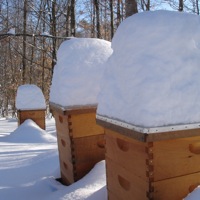Then we took a few posed photos for local journalists, closed up the hives, and went back inside to hang out for a while. I was out in the yard the next day to clean up a bit more and noticed that the two top bar combs we had pulled for the photo op had collapsed. Guess we had them in the sun too long, even though it was pretty cool out. The combs were fine when we put them back in the hive, but it takes the bees some time to re-establish their climate control, and the combs must have failed a few minutes after we returned them. These were combs with unripened honey. The bees have since finished ripening the honey and capped the combs, even though they're slumped on the floor of the hive. There's nothing to do but leave them there over winter for the bees, and clean things up in the Spring.
At the moment we're covering basic bee biology in the seminar. Starting next week we'll discuss Chapters 4 and 7 of Jürgen Tautz's book.































 Honeybees survive by acquisition, defense, and efficient
allocation of various resources, to enable successful
overwintering and reproduction. This requires
sophisticated decision making, akin to that needed by
manufacturing firms, and beyond the capability of a single bee's
brain. But when each bee follows simple
sets of rules, the aggregate effect creates an emergent
intelligence for the colony as a whole, able to react to a
dynamic environment and achieve complex optimizations.
Honeybees survive by acquisition, defense, and efficient
allocation of various resources, to enable successful
overwintering and reproduction. This requires
sophisticated decision making, akin to that needed by
manufacturing firms, and beyond the capability of a single bee's
brain. But when each bee follows simple
sets of rules, the aggregate effect creates an emergent
intelligence for the colony as a whole, able to react to a
dynamic environment and achieve complex optimizations.
 We're interested in understanding some of the
mathematical principles underlying the colony
intelligence of honeybees. We meet roughly every other
week from October through April to discuss articles
from the scientific literature on honeybees. We also
do some mathematical modeling of specific honeybee
optimization behaviors. Along the way, we learn some
aspects of honeybee biology and ecology, as well as
the history and practice of beekeeping.
We're interested in understanding some of the
mathematical principles underlying the colony
intelligence of honeybees. We meet roughly every other
week from October through April to discuss articles
from the scientific literature on honeybees. We also
do some mathematical modeling of specific honeybee
optimization behaviors. Along the way, we learn some
aspects of honeybee biology and ecology, as well as
the history and practice of beekeeping.
 We're also interested in getting to know each other,
and getting to know the bees. In the Fall and Spring, we
meet regularly at Professor Gromoll's home for
hands-on activities in the apiary. This includes an
opening breakfast in the Fall, and a dinner in the
Spring. We'll also start a new honeybee colony for the
group, and take a field trip to a larger apiary in the
area.
We're also interested in getting to know each other,
and getting to know the bees. In the Fall and Spring, we
meet regularly at Professor Gromoll's home for
hands-on activities in the apiary. This includes an
opening breakfast in the Fall, and a dinner in the
Spring. We'll also start a new honeybee colony for the
group, and take a field trip to a larger apiary in the
area.


No comments:
Post a Comment